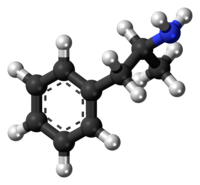
Photo from wikipedia
RATIONALE The growing prevalence of psychostimulant (including amphetamine) use and associated health harms, with limited treatment options, present a global challenge. There is an increasing availability and medical applications of… Click to show full abstract
RATIONALE The growing prevalence of psychostimulant (including amphetamine) use and associated health harms, with limited treatment options, present a global challenge. There is an increasing availability and medical applications of cannabinoids, and growing interest in their therapeutic potential for addictive disorders. OBJECTIVES The objective of this study is to review available data regarding cannabis/cannabinoid co-use or exposure on amphetamine-related outcomes. METHODS Towards the present scoping review, we systematically searched four databases (Medline, Web-of-Science, CINAHL Plus and PsycInfo) using cannabis/cannabinoid and amphetamine text-terms identifying peer-reviewed, English-language studies published in 2000-2020 involving multiple methods approaches among both human and animal study samples, assessing the association of co-use/administration of cannabis/cannabinoids products with non-medical amphetamines on biological, behavioural or health outcomes. RESULTS Twenty-five articles were included. Pre-clinical studies (n = 15) found mostly protective effects of single or repeated cannabinoids administration on rodents in amphetamine addiction models, amphetamine-induced models of human mental disorders (e.g. schizophrenia) and amphetamine-induced neurotoxicity. Human studies (n = 10) were more heterogeneously designed (e.g. cross-sectional, case-control, longitudinal) and assessed natural ongoing cannabis and methamphetamine use or dependence, showing mostly enhanced harms in a diversity of outcomes (e.g. mental health, methamphetamine use, cognition). CONCLUSIONS While human studies suggest cannabis use as an adverse risk factor among non-medical amphetamine users, pre-clinical studies suggest therapeutic potential of cannabinoids, especially cannabidiol, to alleviate amphetamine addiction and harms, including treatment outcomes. Given increasing psychostimulant harms but lack of care options, rigorous, high-quality design studies should aim to translate and investigate pre-clinical study results for potential therapeutic benefits of cannabinoids for amphetamine use/abuse in human subjects.
Journal Title: Psychopharmacology
Year Published: 2021
Link to full text (if available)
Share on Social Media: Sign Up to like & get
recommendations!